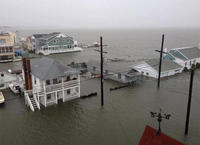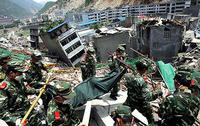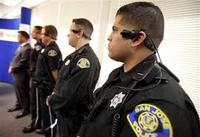-
Post-Sandy insurance rates increase may make coastal living unaffordable

Residents of New York and New Jersey are still coping with the destruction Hurricane Sandy caused, but home and business owners alike will soon face another burden: rising insurance rates and new building codes and requirements that could threaten many that live and work in the coastal areas of the two states
-
-
Lloyd’s says countries are under insured against natural disasters

Lloyd’s of London, the world’s largest insurance company, has warned seventeen countries that a $165 billion global insurance deficit leaves them vulnerable to long-term natural disaster costs; Lloyds says the world may not be able to afford another year like 2011, when natural disasters such as the earthquake and tsunami in Japan and the floods in Thailand caused $4.6 trillion dollars of damage to infrastructure, homes, and businesses, and which resulted in the largest disaster claims ever
-
-
Technology transfer from U.S. federal laboratories to private entities, other governments
In 2010 the eleven U.S. federal laboratories had more than 18,000 active collaborative relationships with private entities and other government agencies, disclosed more than 4,700 inventions, submitted 1,830 patent applications, and received 1,143 patents
-
-
Detection aircraft surveys 600 miles of PG&E California pipeline for gas leaks
PG&E’s transmission pipeline is routinely surveyed each year, typically by ground crews; accessing rural areas with difficult terrain, however, can be time consuming, expensive, and unsafe for crews on the ground; aerial surveys often look for dead vegetation as an indicator of gas leaks
-
-
Part One: Don’t blame the security guard at Y-12
On 28 July 2012, using only wire cutters and flashlights, peace activist Sister Susan Rice, 82 years of age, and two other confederates – both senior citizens themselves — successfully bypassed the elaborate, and expensive, security system around Y-12 National Security Complex at Oak Ridge, Tennessee; though the lone security guard at Y-12 has become a convenient scapegoat, it now appears that the breach reflects system-wide security and safety concerns at nuclear facilities under the National Nuclear Security Administration (NNSA); the breach is best understood as the end result of long standing management and organizational failures within and between DOE, NNSA, and NNSA’s private contractors; the NNSA, in fact, appears burdened by many of the same issues it was created in 2000 to resolve
-
-
More police departments make officers wear headcams

The Salt Lake Police Department is following other law enforcement agencies by having officers wear headgear with cameras attached; a police chief in Salt Lake is taking it one step further by announcing his intention to make the cameras mandatory at his department; this would allow police officers in Salt Lake to record any crime or interaction with the public
-
-
American West's changing climate means economic changes, too
The State of the West Symposium, hosted by the Bill Lane Center for the American West and the Stanford Institute for Economic Policy Research, featured a discussion of the Western United States’ future of extreme heat, declining snowpack, and what it all means for the region’s industry, electricity generation, and policy
-
-
DHS awards $23.6 million to fund development of new software analysis technology
DHS awarded a $23.6 million grant to the Morgridge Institute for Research at the University of Wisconsin-Madison to create the Software Assurance Marketplace, which, over the next five years, will work closely with developers of new software analysis technology and the open source community to advance the security of software; initial operating capabilities for the Software Assurance Marketplace will include the ability continuously to test up to 100 open-source software packages against five software assurance tools on eight platforms, including Macintosh, Linux, and Windows
-
-
Water resources management in a changing world
Visualize a dusty place where stream beds are sand and lakes are flats of dried mud; are we on Mars? In fact, we are on arid parts of Earth, a planet where water covers some 70 percent of the surface; how long will water be readily available to nourish life here? In the United States, more than thirty-six states face water shortages; other parts of the world are faring no better
-
-
World’s great rivers running on empty
Four of the world’s great rivers are all suffering from drastically reduced flows as a direct result of water extraction, according to new research; the researchers found that in all four river basins, over a long period of time, outflows have greatly reduced as a direct result of increased water extractions, and that urgent changes in governance of water are needed to ensure the systems remain healthy and viable
-
-
Learning the lessons of the BP oil spill

In an attempt to limit the harm of the Deepwater Horizon oil spill in the Gulf of Mexico in 2010, three million liters of dispersant were used to dissipate the oil; on the surface the damage seems limited, but the seabed is covered with a thick layer of gunk; scientist from around the world are now working on models that can be consulted by decision makers when there is another oil spill disaster
-
-
The challenge of securing food and water supplies in the twenty-first century
Participants in the Food Security in Dry Lands (FSDL) conference, held last week in Qatar, agreed that the task of managing food and water resources more efficiently and improving the security of supply are set to become one of the biggest challenges for policy makers in the twenty-first century
-
-
“Soft infrastructure” as storm surge defense alternatives
The flooding in New York and New Jersey caused by Superstorm Sandy prompted calls from Governor Andrew Cuomo and other officials to consider building storm surge barriers to protect Lower Manhattan from future catastrophes. Such a strategy, however, could make things even worse for outlying areas that were hit hard by the hurricane, such as Staten Island, the New Jersey Shore, and Long Island’s South Shore, a City College of New York landscape architecture professor warns; landscapers and engineers say that environmentally friendly “soft infrastructure” would mitigate flood damage without sending harm elsewhere
-
-
Sequestration will have a devastating impact on U.S. research enterprise
Three organizations representing more than 200 of the U.S. leading academic research institutions yesterday launched a Web site that aims to inform policymakers and the public of the impact that the upcoming budget sequester would have on federal funding for university research; the Web site highlights the importance of federally funded university research to innovation, economy, an society
-
-
Himalayan glaciers to shrink even if temperatures hold steady, risking South Asia water supply

Come rain or shine, or even snow, some glaciers of the Himalayas will continue shrinking for many years to come; the most conservative findings of a new research on Bhutan, a region in the bull’s-eye of the monsoonal Himalayas, indicate that even if climate remained steady, almost 10 percent of Bhutan’s glaciers would vanish within the next few decades; what is more, the amount of melt water coming off these glaciers could drop by 30 percent
-
More headlines
The long view
Factories First: Winning the Drone War Before It Starts
Wars are won by factories before they are won on the battlefield,Martin C. Feldmann writes, noting that the United States lacks the manufacturing depth for the coming drone age. Rectifying this situation “will take far more than procurement tweaks,” Feldmann writes. “It demands a national-level, wartime-scale industrial mobilization.”
Trump Is Fast-Tracking New Coal Mines — Even When They Don’t Make Economic Sense
In Appalachian Tennessee, mines shut down and couldn’t pay their debts. Now a new one is opening under the guise of an “energy emergency.”
Smaller Nuclear Reactors Spark Renewed Interest in a Once-Shunned Energy Source
In the past two years, half the states have taken action to promote nuclear power, from creating nuclear task forces to integrating nuclear into long-term energy plans.
